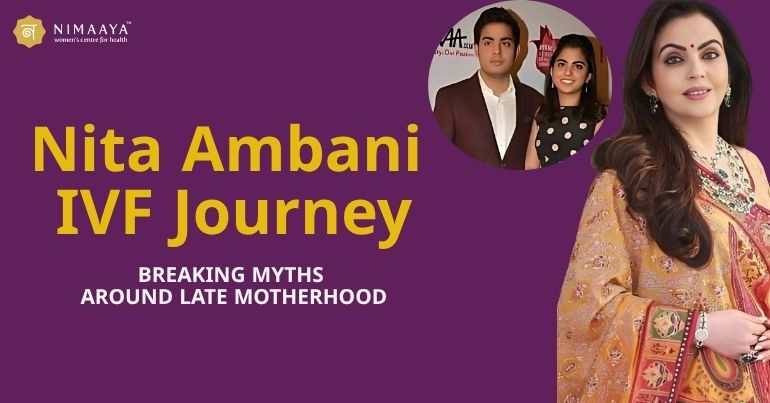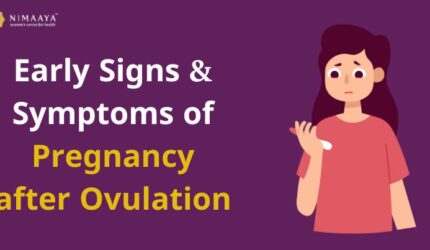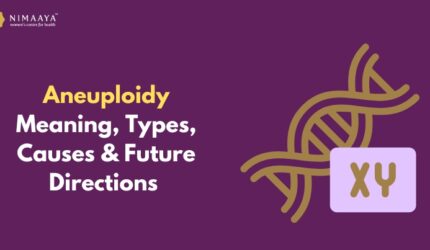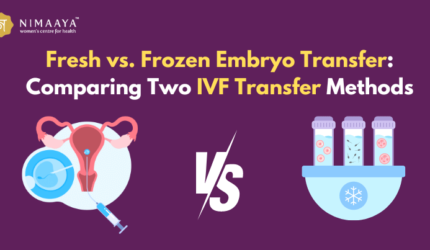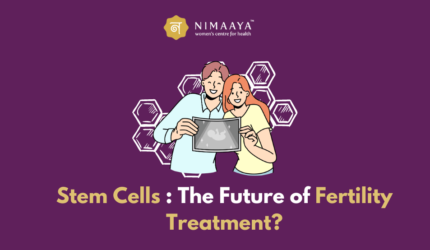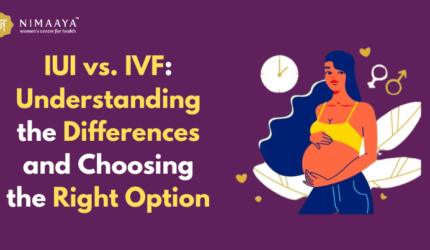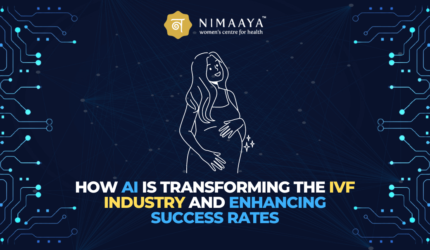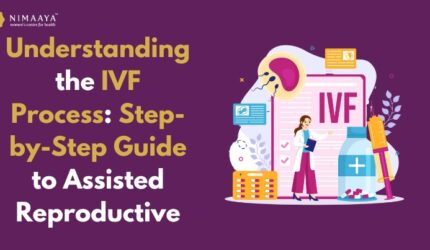Introduction
Motherhood is such a personal and powerful journey that society puts timelines and expectations on it. For years, myths surrounding one’s biological clock have been traveling, with one widely believed being that fertility ends by the mid-30s. The First Lady of Reliance Industries, one of the most powerful women in India, challenged this narrative by accepting motherhood by means of IVF at the age of 44. Her story became a symbol of hope, resilience, and empowerment for millions of women across the world.
This extensive article goes through Nita Ambani IVF journey, what late motherhood means scientifically, commonly held myths, pressure from society and within, and how her decision eventually changed the perception around assisted reproductive technologies. We will also see how modern fertility centres such as Nimaaya empower women to become mothers on their own terms.
Nita Ambani IVF Journey: A Timeline of Determination

Early Struggle for Conception
Nita Ambani married Mukesh Ambani in 1985. Like many couples, they cherished the hope of starting a family but faced unexpected setbacks with infertility. A myriad of attempts did not yield a natural conception, and initially, she was declared infertile by the medical fraternity.
She has candidly shared that the early years of her marriage were emotionally turbulent. Having a hard time getting pregnant pushed her mental and emotional limits. She had to gather enormous strength to overcome the social stigma of being a woman “incapable of giving birth.”
IVF at Age 44
After nearly a decade of unsuccessful attempts, Nita Ambani tried In Vitro Fertilisation (IVF). She welcomed twins, Isha and Akash Ambani, into her life in 1991. IVF, at that period in India, was in the embryonic stage of development and rather stigmatized and poorly understood.
Nita’s decision to publicize her IVF success story was a real revolution and an act of empowerment. She opened the floor for a subject that many women were forced into silence because of societal taboos and misinformation. Her choice brought waves of relief to thousands of would-be mothers, along with personal happiness.
Understanding IVF and Late Motherhood
What is IVF?
In Vitro Fertilisation is a process where an egg is fertilized by sperm outside the body, and the embryo is then implanted in the uterus. IVF is widely used to help individuals or couples struggling with infertility.
Why Age Matters
Female fertility typically starts declining after the age of 35 due to a reduction in both the quantity and quality of eggs. However, thanks to advancements in reproductive medicine, many women over 40 can now successfully conceive using IVF, often with the aid of hormonal stimulation, donor eggs, or cryopreserved embryos.
Success Rates and Challenges After 40
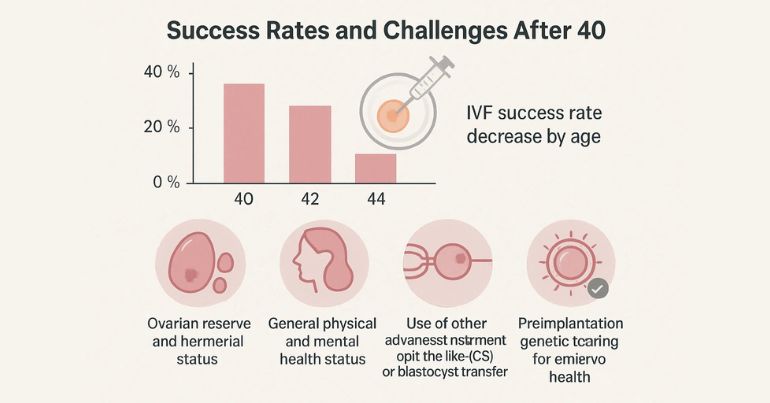
The success rate of IVF decreases with age; however, other factors help to improve results:
- Ovarian reserve and hormonal status
- General physical and mental health status
- Use of other advanced treatment options like ICSI or blastocyst transfer
- Preimplantation genetic testing for embryo health
Following the example of Nita Ambani’s IVF pregnancy during her forties, greater awareness and interest have developed in exploring safe assisted fertility options beyond 35.
The Late Motherhood Myths
Myth 1: Pregnancy After 35 is Too Risky
Fact: While the risk of developing gestational diabetes, hypertension and miscarriage rises with age, regular prenatal care coupled with IVF technology has mitigated many of these risks. Nita’s case exemplifies that a woman at 44 can indeed have a safe and healthy pregnancy with expert medical help.
Myth 2: IVF is Not Successful for Women Over 40
Fact: Many clinics report cases where women get pregnant even in their late 40s, mainly with donor eggs. It is not a one-size-fits-all scenario; success depends mostly on individual factors. Nita Ambani IVF journey is a real-life testament to the effectiveness of IVF when timed and executed with care.
Read More: Pregnancy Symptoms in Gujarati: ગર્ભાવસ્થા ના લક્ષણો
Myth 3: It Is Selfish to Have Children in Late Life
Fact: Older parents are often assumed to lack the necessary energy to care for children, an outdated belief. These days, many women work more on building their careers, their moneymaking capabilities, and emotional preparedness than on motherhood. Even as a grandparent, Nita Ambani still leads an active and lively life, balancing family and philanthropy with immense competence.
Social Stigma and Psychological Pressures
Judgment and Scrutiny
Even though she was among the most influential women in the country, Nita Ambani did not seem immune to the pressures society imposed. There were intrusive questions, insensitive comments, and societal expectations imposed on her, as if she had a “duty” to her role as a wife and mother.
In many cultures, particularly where South Asian cultures are concerned, women’s worth is still largely considered the ability or inability to bear children. Nita’s ability to stand strong in the face of such pressure opened up the discourse on autonomy, bodily rights, and dignity itself.
Emotional Impact of Fertility Treatment
The IVF journey is not just about physical challenges. Science entails injection with all sorts of hormones, various painful procedures, watching an entire treatment cycle conclude, and the rollercoaster of emotional highs and lows that take a person down mentally.
Through transparency about her emotional journey, Nita was helping to normalize many of those struggles that many women face silently.
Redefining the Age of Motherhood
In an era where many choose to become mothers around their late 30s to early 40s, Nita Ambani IVF journey is a strongly resonating one that has been acting as a symbol of a growing global movement. It means women are weaving life along a little further without compromising motherhood.
Modern science can rewrite the biological limitations. She is an example stating the possibility of women having all that there is- life, personal growth, and family- without undergoing the sag of outdated social mores.
Nita Ambani: A Woman-Champion

More than mothering, Nita Ambani has become a strong champion for women’s empowerment. Under her stewardship of the Reliance Foundation, she has promoted women’s causes in education, health, and sports. By choosing to speak openly about IVF, she provided a much-needed voice to countless women struggling with fertility in silence. She dismantled the shame associated with infertility and turned it into a conversation about strength, choice, and dignity.
Know More: IUI Success Symptoms Day by Day
The Role of Advanced Fertility Clinics in Modern Motherhood
With technological advancements in fertility, centers like Nimaaya have emerged as champions of women’s reproductive rights and health.
How Nimaaya is Empowering Late Pregnancy
Nimaaya is among the pioneering fertility centres in India that provide advanced assisted reproductive services, including:
- IVF, ICSI, IUI
- Egg and embryo freezing
- Donor egg and sperm programs
- Genetic testing
- Counseling and psychological support
With patient-first care and customized fertility plans, Nimaaya empowers women to become mothers on their own timelines. Their emphasis on emotional well-being and transparency makes them a trusted name for women over 35 who seek to balance motherhood and life priorities.
Starting Your Fertility Journey in 2025
Conclusion: A Legacy of Hope and Change
Nita Ambani’s IVF story is more than just a personal victory—it is a cultural revolution. She shattered glass ceilings not only in the boardroom but also in the doctor’s office, where she redefined what motherhood looks like after 40.
Inspiring, heartfelt, and courageous, her story assures women that it’s never too late to dream of a family. With support from progressive fertility clinics like Nimaaya, the path to late motherhood is more accessible, safe, and dignified than ever.
Let Nita Ambani’s journey remind us that motherhood isn’t about age—it’s about love, courage, and the unwavering desire to nurture life.
FAQ
Q: How old was Nita Ambani when she became a mother through IVF?
Nita Ambani became a mother at the age of 44 through IVF, after struggling with infertility for several years.
Q: Did Nita Ambani speak publicly about her IVF journey?
Yes, she openly discussed her IVF experience, breaking social taboos and inspiring other women facing similar fertility issues.
Q: Can IVF guarantee pregnancy for women above 40?
No fertility treatment can guarantee pregnancy, but IVF significantly increases the chances—especially when combined with egg or embryo donation, and genetic screening techniques.

